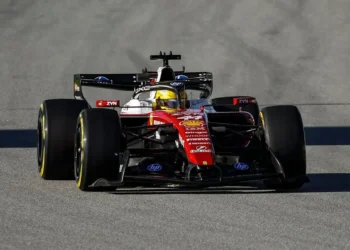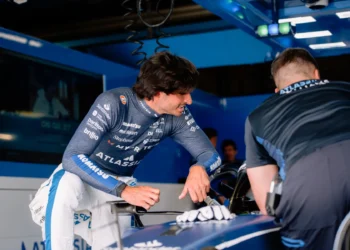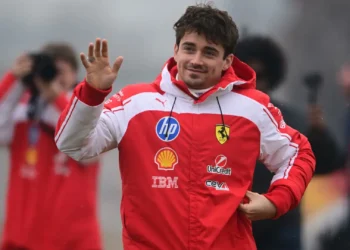Chequered
In a world where speed and strategy meet on the Formula 1 tracks, and in the world of betting where every spin has the potential for good fortune, the role of charity and sponsorship is as vital as the game itself.
Casinos not only offer entertainment, but also actively engage in society, investing in various areas, including motorsport. Recently, the world of Formula 1 has seen an increase in attention to charity projects and sponsorships, where casinos act not only as sponsors, but also as partners contributing to the growth of this exciting sport.
Modern gambling establishments strive to attract customers not only with a wide variety of games and favorable conditions, but also with a sense of social responsibility. Offers like the new no deposit casino bonus allow new players to start playing without the need for an initial investment.
This is similar to casino investments in Formula 1, where the return on investment may not be immediate, but holds great promise for the future. This demonstrates the casino’s innovative approach to conducting business, where the focus is not only on profits and revenues, but also on making a positive impact on society and supporting young talent.
Thus, the goals of casino operators and Formula 1 are aligned – the pursuit of innovation, the search for new talent, and the desire to provide a spectacle that captivates millions of fans worldwide.
In this symbiotic relationship, each party brings its own unique contribution: the casino provides financial support and resources, while Formula 1 offers an exceptional platform to promote and implement charity initiatives.
The interaction between the gambling industry and motorsport creates new opportunities for the development and support of young drivers, and also helps to solidify the position of casinos as socially responsible participants in the market.
Casinos, as prominent players in the entertainment world, have long recognized the potential of Formula 1 as a platform for innovation and global exposure for their brands. Their involvement in car racing goes beyond mere sponsorships; they actively contribute to the development of the sport, making significant investments in technological advancements and track infrastructure.
For example, casinos often fund research and development projects focused on driver safety and enhanced car aerodynamics, resulting in more competitive teams and exciting moments in races. Additionally, casinos invest in improving track infrastructure, making competitions more accessible and comfortable for spectators.
This includes building new stands, improving seating areas, and upgrading technical facilities for the teams. These projects not only enhance the racing experience but also contribute to the growth of tourism in the regions where the races are held.
Supporting young talents is an integral part of the casino’s contribution. Casinos organize and finance programs for up-and-coming drivers, providing scholarships and the opportunity to train with professional teams. This can be compared to offering 50 free spins no deposit in the world of gambling, where new players have the chance to start without an initial investment and test their luck.
Thus, the contribution of casinos to Formula 1 is diverse and encompasses not only financial support, but also the advancement of technology, infrastructure, and the nurturing of a new generation of drivers. This collaboration not only promotes the development of the sport, but also creates new opportunities for society and the economy in the regions where the races take place.
The partnership between casinos and Formula 1 has a rich and captivating history, starting with the early races in Monaco, where the Monte Carlo casino has always been a focal point of attention. Over time, casinos began to use Formula 1 races as a means to attract visitors and expand their brands internationally.
A notable example of the interaction between casinos and Formula 1 is the Caesars Palace Grand Prix in Las Vegas, which took place in the early 80s. Despite criticism of the track, these events were of great importance to the sport, as they determined the fate of the championship title.
Casinos were not only venues to entertain the rich and famous guests of the races, but also served as locations for events and official meetings. This partnership extended to team and driver sponsorships, allowing casinos to gain even more visibility in the world of Formula 1.
Over time, casinos began to invest not only in race sponsorships, but also in supporting young talent, creating programs to nurture future champions.
Today, casinos continue to be active participants in the world of Formula 1, using races as an opportunity to promote their brands and attract new audiences. This collaboration brings new investments and technologies that contribute to the growth and popularity of the sport.
The interaction between casinos and Formula 1 serves as a successful partnership that benefits both the sport and the gambling industry.
The gambling industry significantly invests in supporting young talent in motorsport, especially in the renowned Formula 1 racing series. Casinos and betting companies actively participate as sponsors and partners, providing not only financial support to drivers and individual teams, but also the necessary resources for their development and promotion.
This support includes various aspects, from funding for races to training and investment in research and development related to the safety and performance of race cars.
In addition, gambling companies often contribute to the creation of educational programs and academies for young drivers, offering them a unique opportunity to work alongside high-level professionals and learn advanced technologies and training methods, accelerating their professional growth.
These programs not only prepare young talents for the challenges of professional motorsport at the highest level, but also provide them with an understanding of the importance of teamwork, strategic planning, and physical conditioning.
Investing in young drivers also includes supporting their participation in junior racing series, which serve as a stepping stone to a career in Formula 1. By supporting these initiatives, casinos help young drivers gain experience, showcase their skills, and establish crucial professional connections.
This approach not only promotes the development of individual careers, but also enriches the sport itself, attracting new talent and ensuring a continuous flow of participants at the peak of competition.
Through these initiatives, the gambling industry demonstrates its commitment not only to entertainment and excitement, but also to supporting and developing sports and young athletes. This contribution has long-term significance, as it helps shape the future of motor racing, making it more dynamic, competitive, and thrilling for both participants and spectators.
Thanks to this collaboration, young talents receive genuine opportunities to develop and achieve their dreams, while motor racing gains a new generation of champions capable of maintaining and enhancing its best traditions.
Casinos and Formula 1 have a significant impact on society and sports, bringing elements of entertainment, innovation, and social responsibility. Casinos, as part of the entertainment industry, influence the cultural aspects of society, offering not only gambling games, but also concerts, theatrical performances, and other forms of entertainment.
This creates a connection between cultural events and gambling establishments, facilitating the exchange of cultural ideas and practices.
The architecture of casinos often incorporates cultural elements, creating a unique atmosphere that can become a major tourist attraction, attracting visitors from around the world. Casinos also have an economic impact, generating job opportunities and attracting investments to local communities. They provide a platform for artists, musicians, and other creators, offering them the chance to showcase their work to a wider audience.
On the other hand, Formula 1 is known for its high energy consumption and carbon footprint, but race organizers and teams are actively working to reduce their environmental impact by introducing more efficient engines and using biofuels. This not only helps reduce emissions, but also encourages the development of new technologies that can later be used in the automotive industry.
Casinos and Formula 1 also contribute to charity and social initiatives. Sports clubs and leagues organize charity events to help children, people with disabilities, and other in need. This includes funding programs for children, support for inclusive spaces, and involvement of people with disabilities in sports.
Therefore, the impact of casinos and Formula 1 on society and sports is multifaceted, encompassing not only economic and cultural aspects, but also social responsibility and sustainable development. These industries not only contribute to the advancement of sports, but also create new opportunities for society and the economy of the regions where races take place and casinos are located.
In conclusion, the interaction between casinos and Formula 1 has a variety of meanings. Casinos, as part of the gambling industry, make a significant contribution to the economy, paying substantial taxes and acting as major sponsors of teams and sporting events. This contributes to the development of the sport and increases its appeal to viewers.
On the other hand, Formula 1 serves as a platform for technological innovation that later finds application in everyday life. Advances in motorsport technology impact the safety, efficiency, and environmental sustainability of vehicles, which has implications for society as a whole.
Casinos also demonstrate social responsibility by engaging in the fight against gambling addiction and providing information about the risks associated with gambling. This helps protect vulnerable populations and maintain social stability.
Thus, the collaboration between casinos and Formula 1 not only contributes to economic and technological development, but also strengthens social responsibility and sustainable growth. This partnership creates new opportunities and perspectives for the development of society and sports.
© 2024
Brazilian driver Max Verstappen achieved an impressive victory at the Monaco Grand Prix last Sunday. Verstappen, from the Red Bull Racing team, showed skill and determination in overcoming all challenges and crossing the finish line in first place. This victory marks a historic moment for Brazil, as Verstappen became the first Brazilian driver to win the Monaco Grand Prix in over a decade.
The race in Monaco is known to be one of the toughest and most challenging on the Formula 1 calendar. With its narrow streets and tight corners, the track demands precision and maximum concentration from the drivers. Verstappen showcased his talent by mastering the track and maintaining flawless performance throughout the race.
Verstappen’s victory is also a major boost for the Red Bull Racing team. With this achievement, the team demonstrates its strength and competence, solidifying its position as one of the main contenders in the 2024 Formula 1 season. Verstappen and his teammate, Sergio Perez, have shown consistent and promising performance, putting Red Bull Racing in a favorable position to compete for the world championship.
Furthermore, Verstappen’s victory in Monaco also holds a special meaning for Brazil. The country, which was once home to great Formula 1 drivers, was eager for a new champion. Verstappen, with his skill and determination, showed that he is up to the legacy left by Brazilian icons like Ayrton Senna and Nelson Piquet.
With the Formula 1 season in full swing, Brazilian fans are excited about Verstappen’s future prospects. His victory in Monaco is just the beginning of a promising and thrilling journey. Brazil is looking forward to seeing the young driver in action again and cheering for more achievements on the tracks.










